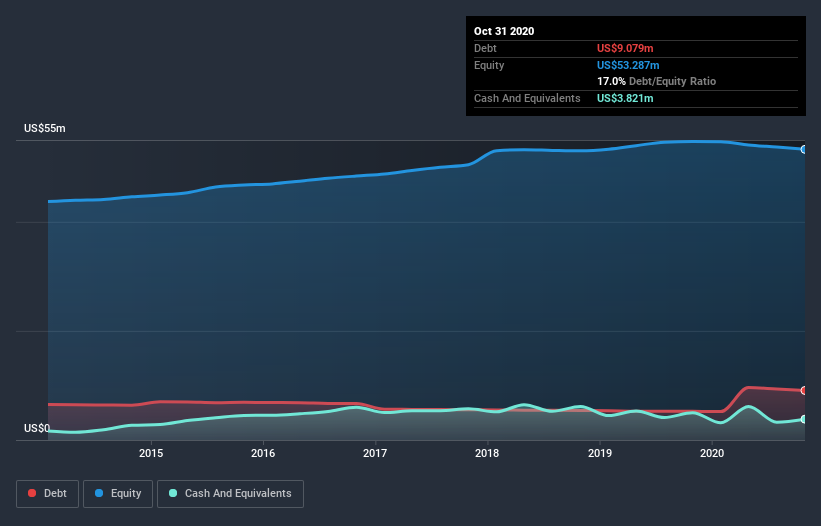- United States
- /
- Real Estate
- /
- NasdaqCM:MAYS
Health Check: How Prudently Does J.W. Mays (NASDAQ:MAYS) Use Debt?
Warren Buffett famously said, 'Volatility is far from synonymous with risk.' It's only natural to consider a company's balance sheet when you examine how risky it is, since debt is often involved when a business collapses. We note that J.W. Mays, Inc. (NASDAQ:MAYS) does have debt on its balance sheet. But should shareholders be worried about its use of debt?
When Is Debt A Problem?
Debt assists a business until the business has trouble paying it off, either with new capital or with free cash flow. Part and parcel of capitalism is the process of 'creative destruction' where failed businesses are mercilessly liquidated by their bankers. While that is not too common, we often do see indebted companies permanently diluting shareholders because lenders force them to raise capital at a distressed price. Of course, debt can be an important tool in businesses, particularly capital heavy businesses. When we examine debt levels, we first consider both cash and debt levels, together.
See our latest analysis for J.W. Mays
How Much Debt Does J.W. Mays Carry?
You can click the graphic below for the historical numbers, but it shows that as of October 2020 J.W. Mays had US$9.08m of debt, an increase on US$5.25m, over one year. However, because it has a cash reserve of US$3.82m, its net debt is less, at about US$5.26m.

How Healthy Is J.W. Mays's Balance Sheet?
We can see from the most recent balance sheet that J.W. Mays had liabilities of US$4.54m falling due within a year, and liabilities of US$41.2m due beyond that. Offsetting this, it had US$3.82m in cash and US$2.44m in receivables that were due within 12 months. So it has liabilities totalling US$39.5m more than its cash and near-term receivables, combined.
This deficit is considerable relative to its market capitalization of US$45.4m, so it does suggest shareholders should keep an eye on J.W. Mays's use of debt. Should its lenders demand that it shore up the balance sheet, shareholders would likely face severe dilution. The balance sheet is clearly the area to focus on when you are analysing debt. But it is J.W. Mays's earnings that will influence how the balance sheet holds up in the future. So if you're keen to discover more about its earnings, it might be worth checking out this graph of its long term earnings trend.
Over 12 months, J.W. Mays made a loss at the EBIT level, and saw its revenue drop to US$19m, which is a fall of 8.0%. That's not what we would hope to see.
Caveat Emptor
Importantly, J.W. Mays had an earnings before interest and tax (EBIT) loss over the last year. To be specific the EBIT loss came in at US$1.8m. Considering that alongside the liabilities mentioned above does not give us much confidence that company should be using so much debt. So we think its balance sheet is a little strained, though not beyond repair. We would feel better if it turned its trailing twelve month loss of US$1.4m into a profit. So to be blunt we do think it is risky. The balance sheet is clearly the area to focus on when you are analysing debt. But ultimately, every company can contain risks that exist outside of the balance sheet. Consider for instance, the ever-present spectre of investment risk. We've identified 2 warning signs with J.W. Mays (at least 1 which is potentially serious) , and understanding them should be part of your investment process.
Of course, if you're the type of investor who prefers buying stocks without the burden of debt, then don't hesitate to discover our exclusive list of net cash growth stocks, today.
When trading J.W. Mays or any other investment, use the platform considered by many to be the Professional's Gateway to the Worlds Market, Interactive Brokers. You get the lowest-cost* trading on stocks, options, futures, forex, bonds and funds worldwide from a single integrated account. Promoted
New: Manage All Your Stock Portfolios in One Place
We've created the ultimate portfolio companion for stock investors, and it's free.
• Connect an unlimited number of Portfolios and see your total in one currency
• Be alerted to new Warning Signs or Risks via email or mobile
• Track the Fair Value of your stocks
This article by Simply Wall St is general in nature. It does not constitute a recommendation to buy or sell any stock, and does not take account of your objectives, or your financial situation. We aim to bring you long-term focused analysis driven by fundamental data. Note that our analysis may not factor in the latest price-sensitive company announcements or qualitative material. Simply Wall St has no position in any stocks mentioned.
*Interactive Brokers Rated Lowest Cost Broker by StockBrokers.com Annual Online Review 2020
Have feedback on this article? Concerned about the content? Get in touch with us directly. Alternatively, email editorial-team (at) simplywallst.com.
About NasdaqCM:MAYS
J.W. Mays
Engages in the owning, operation, and leasing of commercial real estate properties in the United States.
Adequate balance sheet with very low risk.
Similar Companies
Market Insights
Weekly Picks

Solutions by stc: 34% Upside in Saudi's Digital Transformation Leader


The AI Infrastructure Giant Grows Into Its Valuation
Recently Updated Narratives


The "Sleeping Giant" Wakes Up – Efficiency & Monetization


The "Rate Cut" Supercycle Winner – Profitable & Accelerating


The Industrialist of the Skies – Scaling with "Automotive DNA
Popular Narratives


MicroVision will explode future revenue by 380.37% with a vision towards success


NVDA: Expanding AI Demand Will Drive Major Data Center Investments Through 2026



